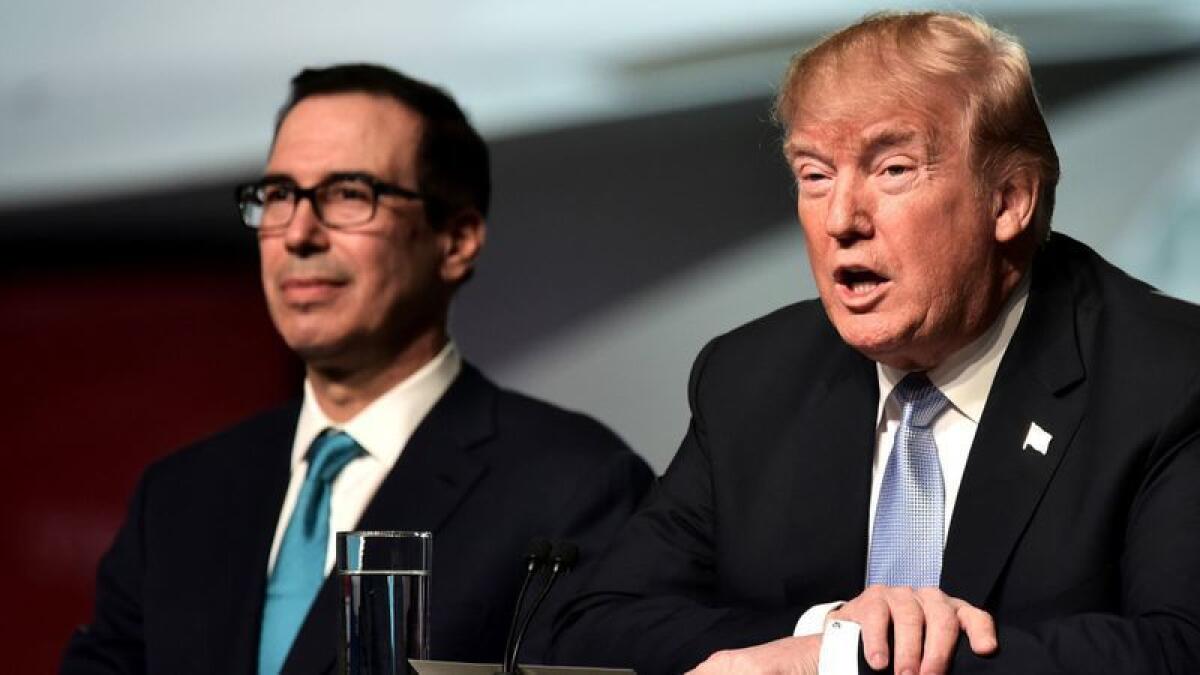Capitol Journal: Trump won’t publicly release his tax returns. Politicians shouldn’t have to

Reporting from Sacramento — President Trump is right about one thing: He shouldn’t have to publicly release his tax returns.
Even a president has some right of privacy. And politics-playing Democrats are trying to invade it — in Congress and the California Legislature.
But it’s a delicate line.
It doesn’t mean that congressional oversight committees shouldn’t take a private look at the president’s personal and business returns to ensure he isn’t being coddled with special favors by the Internal Revenue Service. They should and the law seems to give them the right to.
The dilemma is that Congress leaks like a rotted roof. It’s hard to envision Congress getting a private look at Trump’s returns without them winding up on every newspaper’s front page and debated on cable TV ad nauseam.
In Sacramento, a Democratic bill is advancing that would require presidential candidates to publicly release their tax returns for the last five years. After redacting such personal information as Social Security numbers, the returns would be posted on the secretary of state’s website — an effective way for the secretary to draw eyes to his or her homepage.
Candidates who refused to release their taxes wouldn’t be allowed on the California ballot.
“Transparency provides the basis for accountability in government,” says the bill’s author, Sen. Mike McGuire (D-Healdsburg).
McGuire also argues that every major presidential candidate since Jimmy Carter in 1976 — except for Trump in 2016 — has publicly released tax returns voluntarily. In some cases, it was less voluntary and due more to browbeating by opponents and reporters.
McGuire got a similar bill passed in 2017 and then-Gov. Jerry Brown wisely vetoed it. If Brown hadn’t, he would have been guilty of hypocrisy. He refused to release his returns when running for governor in 2010 and 2014.
In his veto message, Brown wrote that he recognized “the political attractiveness — even the merits — of getting President Trump’s tax returns.” But he added: “I worry about the political perils of individual states seeking to regulate presidential elections in this manner.
“First, it may not be constitutional.
“Second, it sets a ‘slippery slope’ precedent. Today we require tax returns, but what would be next? Five years of health records? A certified birth certificate? High school report cards?
“And will these requirements vary depending on which political party is in power? A qualified candidate’s ability to appear on the ballot is fundamental to our democratic system…. I hesitate to start down a road that well might lead to an ever escalating set of differing state requirements for presidential candidates.”
Unlike Brown, Gov. Gavin Newsom released six years of his tax returns while running for the office. The Democrat hasn’t taken a position on McGuire’s bill.
Why not require gubernatorial candidates to also release their taxes or be denied a ballot slot? I asked McGuire. He replied that Newsom did release his taxes. Yes, but Brown didn’t.
“The president is a unique office,” the lawmaker said. “He shapes national tax policy, foreign trade policy, proposes multibillion-dollar contracts with corporations, in all of which the president can enrich himself.”
That’s why three congressional tax committees can request the president’s returns. House Ways and Means Chairman Richard E. Neal (D-Mass.) has asked for them. The law decrees that the Treasury secretary then “shall” turn them over. Trump’s acting Chief of Staff Mick Mulvaney has insisted that Democrats will “never” see the returns. But it might not matter what he says.
The returns can only be viewed in closed executive session barred to the public. Unauthorized public release would be a felony. But there’s a contradiction. The law also allows, under certain circumstances, for a committee to insert the returns into the public record. This could become a historic court case.
There should probably be a law that requires a presidential candidate to list every single investment, source of income and savings account without spelling out all the details of a tax return. We don’t need to know what charities the candidate donates to.
Basically, someone’s tax return should be solely the business of the taxpayer and tax collector.
Yes, I know, Trump is an unsavory character. He routinely lies. His returns conceivably could win prizes for creative writing. But, frankly, Democrats pounding on him is getting boring.
U.S. Sen. Mitt Romney (R-Utah) had it about right when he told NBC’s “Meet the Press” Sunday: “Democrats … going after his tax returns through a legislative action is moronic. That’s not going to happen. The courts are not going to say that you can compel a person running for office to release their tax returns. So he’s going to win this victory.”
What California’s huge Democratic congressional delegation should be doing is fighting to resurrect all our state and local tax deductions on federal returns. Trump and Republicans took them away. It hurt many people in high-tax, mostly Democratic states.
The whole tax release brouhaha isn’t that great a political issue anyway. Trump is the best example. He won despite snubbing modern tradition. So did Jerry Brown — twice.
A nationwide Morning Consult/Politico poll released Wednesday showed that a slim majority of registered voters, 51%, support Democratic congressional efforts to obtain Trump’s returns.
But it’s a sure bet that the 2020 election will not turn on whether Trump releases them.
And it certainly won’t matter whether Trump is allowed on the California ballot. He could never carry the state and wouldn’t even try.
Follow @LATimesSkelton on Twitter
More to Read
Get the L.A. Times Politics newsletter
Deeply reported insights into legislation, politics and policy from Sacramento, Washington and beyond. In your inbox three times per week.
You may occasionally receive promotional content from the Los Angeles Times.











